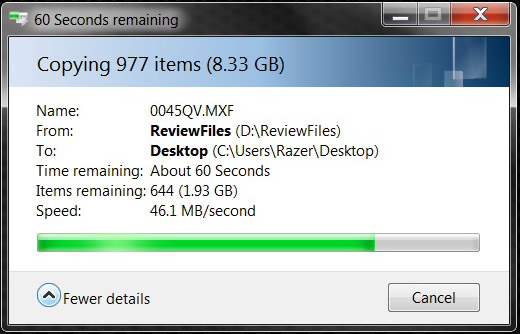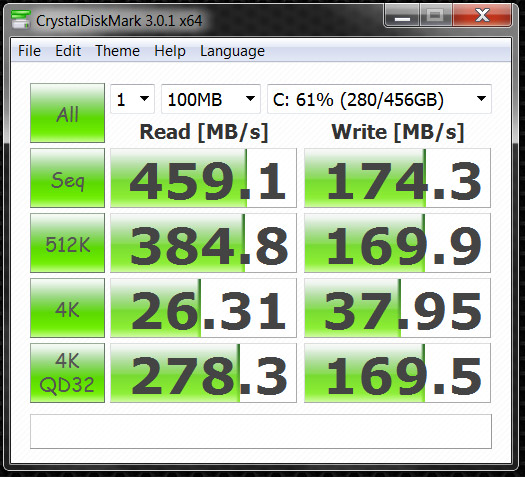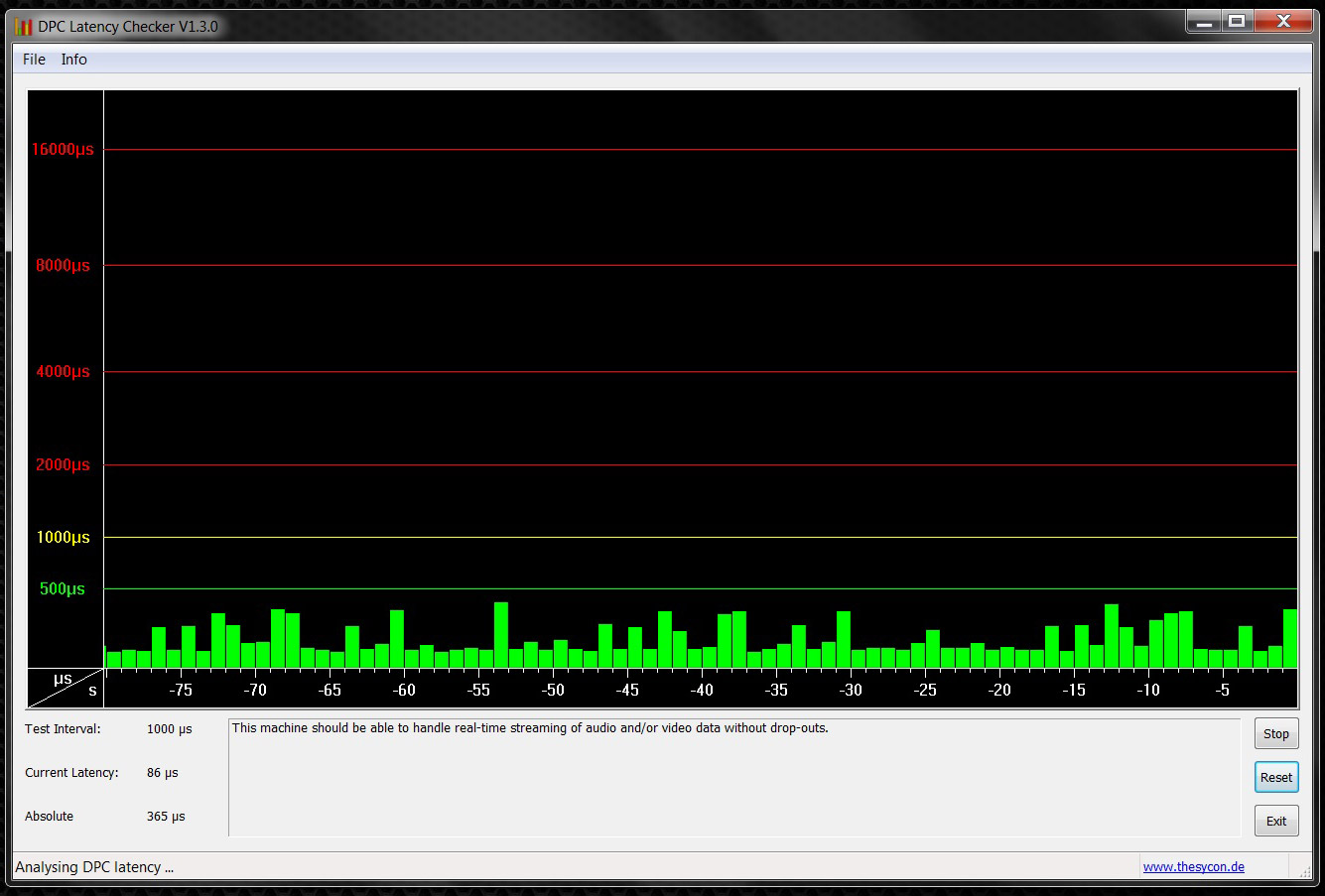Razer's Second-Generation Blade Notebook Review: Focusing On The Z
Razer recently sent us its second-gen Blade, complete with a Core i7-3632QM quad-core CPU and GeForce GTX 660M. Eight gigabytes of memory, a 500 GB hard drive, and an SSD cache round out this 17" gaming notebook. Would you believe it's less than 1" thick?
Storage, System Latency, And Audio Testing
Disk Performance
The Razer Blade ships with a 500 GB 7,200 RPM hard drive, with a 64 GB SATA 6Gb/s SSD for caching. This means you'll only see a 500 GB disk, though it'll hopefully run as fast as an SSD once the caching software learns your most frequently-accessed data. Of course, when you first access information not in the cache, performance will reflect that of a normal hard drive. As you can see below, the first time we copy a file, transfer speeds are a very pedestrian 46.1 MB/s.
Running a quick test with CrystalDiskMark, we see that the Lite-On 64 GB cache drive is very fast. We had hoped that running a single test might yield an indication of uncached speed, but this is obviously the SSD and not the hard drive.
Overall, the Blade's storage performance is good. If you play a lot of different games, it's possible that you won't have all of your latest levels loaded up in cache when you fire them up. This invariably leads to delays. But once they're cached, performance improves considerably. During any given week, I play two or three titles. And, in testing, I didn't run into any issues with performance or caching.
Audio Performance
Audio fed to external amplifiers via the analog headphone jack sounded fine, and we had no issues connecting to digital receivers or televisions via HDMI. The analog output turned up no bothersome crackle or pops playing back music.
We listened to a few tunes through the headphone jack using several devices. Through the excellent-sounding and very sensitive Etymotic HF3 in-ear earphones, we heard no noise, and music playback sounded good. The slightly bass-heavy Bowers and Wilkins C5 in-ear earphones also sounded good. Listening through the very detailed and slightly bass-shy Shure SE425 in-ear earphones sound fine as well. Using the Blade's Dolby software, we bumped up the 32 Hz slider to give the Shures a little more low-end kick. Moving out of the ear to covering them, the 32 ohm Grado SR125s sounded good, too. Using the Sennheiser HD 600s, Razer's Blade R2, like most notebooks, runs out of juice trying to drive their difficult 300 ohm load.
Get Tom's Hardware's best news and in-depth reviews, straight to your inbox.
System Latency
Using the DPC Latency Checker, we found the Razer Blade R2 to have low overall system latency. This means that people working with multi-track audio should have no problems using this machine.
Current page: Storage, System Latency, And Audio Testing
Prev Page Battery Life and AC Power Draw Next Page Brightness, Contrast, Uniformity, Gamma-
ShadyHamster Having all the I/O on the left isn't such a bad idea, keeps the right side clear so cables don't get in the way if you use a mouse close to your laptop like i do.Reply -
mayankleoboy1 Wow, this is a very thorough review! Great work!Reply
This notebook has looked into almost every possible detail. I was particularly impressed that in the heat run, the "WASD" key area was cooler than the rest. This bespeaks extreme attention to details. -
Chairman Ray This is an amazing system. Great job by Razer! I won't be buying it due to the steep price tag, but definitely going to recommend it to those who are willing to pay for the best.Reply -
xpeh While the price is steep, this laptop is definitely one of the best looking gaming laptops I've ever seen.Reply -
g-unit1111 I very badly need to get a new laptop but this one is way too rich for my blood. I would definitely consider this if it were about $1K less.Reply -
Pyree g-unit1111I very badly need to get a new laptop but this one is way too rich for my blood. I would definitely consider this if it were about $1K less.Lenovo Y580/Y500 GT650m SLIReply -
slomo4sho xpehWhile the price is steep, this laptop is definitely one of the best looking gaming laptops I've ever seen.IMO having a $1000 gaming desktop and spending $500-600 on a laptop when Haswell comes out is probably much more economical for the occasional gaming on a laptop paired with a sold desktop to enjoy the higher quality graphics. Even at $2500, this laptop can't even keep up with the $500 budget gaming build from last month.Reply -
de5_Roy nice review. :)Reply
my real amusement came from the apu-powered laptop's performance, though. it bottlenecked the discreet gpu so badly.... :D -
corvak Gaming laptops have never been priced in a range that makes them worth buying for me. They don't really have enough battery life to really take advantage of portability, and the price/performance is in a whole other league if you compare it to any desktop build.Reply
Even buying a cheap laptop for travel use alongside a gaming desktop is likely to come in cheaper than many of these.
-
Goose_Nipples ARMY'S KA-Bar?!?!?!?! Hooooooold up my friend. Devil dog here who's jimmies have most assuredly been rustled.Reply


